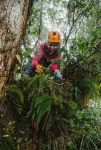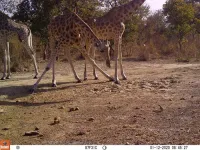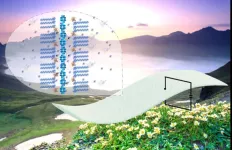(Press-News.org) WASHINGTON, D.C. — The U.S. Department of Energy (DOE) today announced the selection of 93 early career scientists from across the country who will receive a combined $135 million in funding for research covering a wide range of topics, from artificial intelligence to astrophysics to fusion energy. The 2023 Early Career Research Program awardees represent 47 universities and 12 DOE National Laboratories across the country. These awards are a part of the DOE’s long-standing efforts to develop the next generation of STEM leaders to solidify America’s role as the driver of science and innovation around the world.
“Supporting America’s scientists and researchers early in their careers will ensure the United States remains at the forefront of scientific discovery,” said U.S. Secretary of Energy Jennifer M. Granholm. “The funding announced today gives the recipients the resources to find the answers to some of the most complex questions as they establish themselves as experts in their fields.”
Funding for today’s awards is part of the DOE Office of Science’s Early Career Research Program, which bolsters the nation’s scientific workforce by supporting exceptional researchers at the outset of their careers, when many scientists do their most formative work. Since its inception in 2010, the Early Career Research Program has made 868 awards, with 564 awards to university researchers and 304 awards to National Lab researchers.
The 93 awards announced today will go to scientists in 27 different states: California (14); Illinois (10); New York (8); Tennessee (7); Colorado, New Mexico, and Washington (5 each); Arizona and Massachusetts (4); New Jersey, Ohio, Texas, and Virginia (3); Alabama, Maryland, North Carolina, Pennsylvania, and Wisconsin (2); and Arkansas, Georgia, Iowa, Michigan, Mississippi, Oklahoma, Rhode Island, South Carolina, and Wyoming.
Information about the 93 awardees and their research projects is available on the Early Career Research Program webpage.
To be eligible for Early Career Research Program awards, a researcher must be an untenured, tenure-track assistant or associate professor at a U.S. academic institution or a full-time employee at a DOE National Laboratory who received a Ph.D. within the past 12 years. Research topics are required to fall within the scope of one of the Office of Science’s eight major program areas:
Accelerator R&D and Production
Advanced Scientific Computing Research
Basic Energy Sciences
Biological and Environmental Research
Fusion Energy Sciences
High Energy Physics
Isotope R&D and Production
Nuclear Physics
Awardees were selected based on peer review by outside scientific experts. The projects announced today are selections for negotiation of a financial award, and the final details for each are subject to final grant and contract negotiations between DOE and the awardees.
Total funding is $135 million for projects lasting up to five years in duration, with $69 million in Fiscal Year 2023 dollars and the additional funding contingent on congressional appropriations.
Profiles of some previous award recipients, including information about how the program helped them in their research and careers, can be found on the Early Career profiles page.
END
DOE awards $135 million for groundbreaking research by 93 early career scientists
Funding part of DOE's commitment to supporting next generation of America’s STEM leaders
2023-08-04
ELSE PRESS RELEASES FROM THIS DATE:
An adjuvanted intranasal vaccine for COVID-19 protects both young and old mice
2023-08-04
While much of the global concern has subsided, COVID-19 is still a very real threat, especially to people with compromised immune systems or who are over 65.
Vaccination offers excellent protection against serious illness and death, but the current vaccines have room for improvement in their ability to stop the spread of SARS-CoV-2 at the point of entry in the upper respiratory tract.
A collaborative research effort led by the University of Michigan and the Icahn School of Medicine at Mount Sinai has resulted in a nasal vaccine adjuvant that stops ...
Five ORNL scientists to receive DOE Early Career Research awards
2023-08-04
The Department of Energy’s Office of Science has selected five Oak Ridge National Laboratory scientists for Early Career Research Program awards.
Since its inception in 2010, the program bolsters national scientific discovery by supporting early career researchers in fields pertaining to the Office of Science's eight major program offices: Advanced Scientific Computing Research, Biological and Environmental Research, Basic Energy Sciences, Fusion Energy Sciences, High Energy Physics, Nuclear Physics, Accelerator R&D and Production and Isotope R&D and Production.
Award ...
In the treetops: USU ecologist studies canopy soil abundance, chemistry
2023-08-04
LOGAN, UTAH, USA - When we think of soil, most of us think of dirt on the ground. But a surprising amount of the planet’s soil thrives in the treetops of old-growth forests, high above terra firma.
This organic matter, composed of decaying leaves and branches, airborne particulates and moisture, is called canopy soil or arboreal soil. Its study is relatively new, says Utah State University ecologist Jessica Murray. She’s among researchers unraveling mysteries of the dense, mossy humus that provides rich habitat for insects, birds, fungi, worms and plants, as well as a generous reservoir for carbon storage.
Murray and colleagues from Texas ...
HSE researchers question the correctness of experiments denying free will
2023-08-04
Neuroscientists from HSE University have criticized the famous studies that question the free will of our decisions. You can’t shift responsibility for your actions to the brain. The results of the new work were published in the Neuropsychologia journal.
The dispute about how much free will people have in making their decisions has been going for decades. Neuroscientists have joined this discussion thanks to the electroencephalographic (EEG) experiments of Benjamin Libet. In the 1970-1980s, he showed that 0.5–1.5 seconds before conscious awareness of the intention to perform a movement, subjects ...
Kordofan giraffes face local extinction if poaching continues
2023-08-04
For immediate release
Friday 4 August 2023
Kordofan giraffes face local extinction if poaching continues
Poaching of two Critically Endangered Kordofan giraffes per year could result in extinction in just 15 years within Cameroon’s Bénoué National Park without intervention. These are the alarming new findings of a University of Bristol and Bristol Zoological Society-led study published in the African Journal of Ecology.
One of the last populations of Kordofan giraffes roam Cameroon's Bénoué ...
Team creates power generator that runs on natural atmospheric humidity
2023-08-04
Scientists are looking for ways to use the low-value energy widely distributed in natural environments to generate electricity. A research team has created a power generator that collects the natural atmospheric humidity and produces continuous electrical signals. This is the first humidity generator designed using a nano-sized material called polyoxometalates. It holds the potential of being a new research direction for polyoxometalates in the sustainable utilization of low-value energy.
The team’s work is published in the journal Nano Research on August 01.
The team set out to solve ...
New deep-learning approach gets to the bottom of colonoscopy
2023-08-04
Researchers have developed a pair of modules that gives a boost to the use of artificial neural networks to identify potentially cancerous growths in colonoscopy imagery, traditionally plagued by image noise resulting from the colonoscopy insertion and rotation process itself.
A paper describing the approach was published in the journal CAAI Artificial Intelligence Research on June 30.
Colonoscopy is the gold standard for detecting colorectal growths or ‘polyps’ in the inner lining of your colon, also known as the large intestine. ...
Influenza shows no seasonality in tropics, posing challenges for health care
2023-08-04
UNIVERSITY PARK, Pa. — In temperate climates, like North America and Europe, flu season starts in the fall, peaks in the winter and ends in the spring. While public health officials have generally assumed that influenza is also seasonal in tropical climates, new research led by Penn State has found little evidence of a repeatable pattern in influenza cases in Vietnam. The findings suggest that influenza is likely unpredictable throughout the tropics, posing substantial challenges for prevention and management of cases for the one-third of the global population living in tropical areas.
“The World ...
Prevalence, risk factors for school-associated transmission of SARS-CoV-2
2023-08-04
About The Study: In this study of Massachusetts schools, the secondary attack rate for SARS-CoV-2 among school-based contacts was low during two periods, and factors associated with transmission risk varied over time. These findings suggest that ongoing surveillance efforts may be essential to ensure that both targeted resources and mitigation practices remain optimal and relevant for disease prevention.
Authors: Sandra B. Nelson, M.D., of Massachusetts General Hospital in Boston, is the corresponding author.
To access the embargoed study: Visit our For The Media website at this link https://media.jamanetwork.com/
(doi:10.1001/jamahealthforum.2023.2310)
Editor’s ...
Racial, ethnic disparities in survival among people with second primary cancer
2023-08-04
About The Study: In this study of 230,000 persons with second primary cancers in the U.S., the Black population had a higher risk of death from both cancer and cardiovascular disease compared with the white population, whereas the Hispanic population had a higher risk of death from cancer. These results suggest that research priorities to address survival disparities in the growing population of survivors of multiple primary cancers are warranted.
Authors: Hyuna Sung, Ph.D., of the American Cancer Society in Atlanta, is ...
LAST 30 PRESS RELEASES:
$3 million NIH grant funds national study of Medicare Advantage’s benefit expansion into social supports
Amplified Sciences achieves CAP accreditation for cutting-edge diagnostic lab
Fred Hutch announces 12 recipients of the annual Harold M. Weintraub Graduate Student Award
Native forest litter helps rebuild soil life in post-mining landscapes
Mountain soils in arid regions may emit more greenhouse gas as climate shifts, new study finds
Pairing biochar with other soil amendments could unlock stronger gains in soil health
Why do we get a skip in our step when we’re happy? Thank dopamine
UC Irvine scientists uncover cellular mechanism behind muscle repair
Platform to map living brain noninvasively takes next big step
Stress-testing the Cascadia Subduction Zone reveals variability that could impact how earthquakes spread
We may be underestimating the true carbon cost of northern wildfires
Blood test predicts which bladder cancer patients may safely skip surgery
Kennesaw State's Vijay Anand honored as National Academy of Inventors Senior Member
Recovery from whaling reveals the role of age in Humpback reproduction
Can the canny tick help prevent disease like MS and cancer?
Newcomer children show lower rates of emergency department use for non‑urgent conditions, study finds
Cognitive and neuropsychiatric function in former American football players
From trash to climate tech: rubber gloves find new life as carbon capturers materials
A step towards needed treatments for hantaviruses in new molecular map
Boys are more motivated, while girls are more compassionate?
Study identifies opposing roles for IL6 and IL6R in long-term mortality
AI accurately spots medical disorder from privacy-conscious hand images
Transient Pauli blocking for broadband ultrafast optical switching
Political polarization can spur CO2 emissions, stymie climate action
Researchers develop new strategy for improving inverted perovskite solar cells
Yes! The role of YAP and CTGF as potential therapeutic targets for preventing severe liver disease
Pancreatic cancer may begin hiding from the immune system earlier than we thought
Robotic wing inspired by nature delivers leap in underwater stability
A clinical reveals that aniridia causes a progressive loss of corneal sensitivity
Fossil amber reveals the secret lives of Cretaceous ants
[Press-News.org] DOE awards $135 million for groundbreaking research by 93 early career scientistsFunding part of DOE's commitment to supporting next generation of America’s STEM leaders



